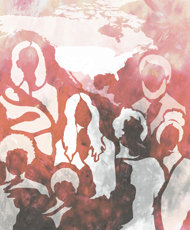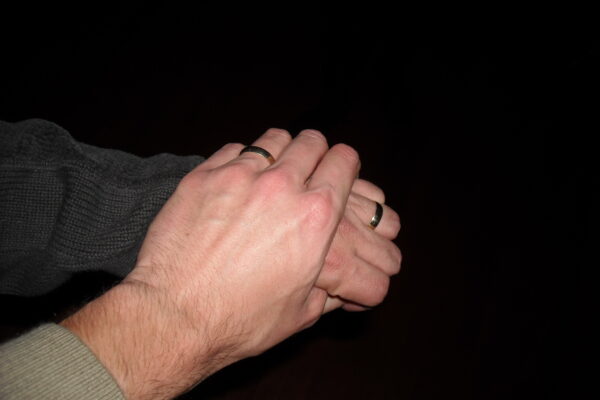By Jessica McCafferty, LGBT Equality Fellow
Josh and PG met in Quebec, Canada when Josh and PG were attending school. Josh was an American citizen, while PG was a resident of Canada. It was September 16, 2006, so Josh had a tough decision to make, as he had to choose between going to the Mexican Independence Day party or attending a welcome party at their university Gay and Lesbian Club. Josh chose well and, as they say, the rest is history- they just celebrated their seventh year together. They were also the first same sex couple in Idaho to be granted legal permanent resident (LPR) status based on a spousal relationship. This became possible only after the U.S. Supreme Court ruled Section 3 of the Defense of Marriage Act (DOMA) unconstitutional, paving the way for certain federal benefits to apply to same-sex married couples.
PG contacted the ACLU to share the news just hours after they had gotten word that they had successfully completed all the steps in the immigration process for PG to be granted official LPR status..
What did you both do when you found out that you had been granted a green card?
We kissed. Then we texted all our friends and family with the good news.
Of course before the green card came love and marriage. PG proposed on their three-year anniversary on the exact same spot where they first kissed. They eventually married in Canada. PG had this to say:
Although it may sound cliché, it was one of the happiest days of our lives. We had been together five years on that date and we felt an even stronger connection.
As most couples know, marriages are hard work, and Josh and PG’s was no different. Josh, being an American citizen, and PG, being Canadian, had challenges after their decision to spend the rest of their lives together. When PG and Josh were married in Canada, Josh received legal status there. Same-sex marriage is recognized no different than opposite sex marriage, and that made immigration status problems less complicated while they lived in Canada. But when Josh thought his options for a job were going to be better in the US, complications arose in their life together.
PG, what was it like knowing that your marriage wouldn’t be recognized in the US?
It was frustrating to see that it wasn’t recognized on the federal level regardless of whether I had a job or not. Had I been a woman, I would have had my green card long time ago.
Did PG’s inability to live in the US permanently put any strife on your relationship?
Of course. PG had to leave the US every six months. It became so difficult that PG ended up going back to school in Canada in order to avoid the revolving-door situation. Josh had to travel to Canada a few times a year so we could be together.
On June 26th, 2013, Josh and PG’s potential to live in the US changed as a result of the U.S. Supreme Court declaring section 3 of DOMA unconstitutional. Suddenly, certain federal benefits given to heterosexual couples became an option for PG and Josh as a result of their legal marriage in Canada. A spousal immigration visa was now possibility for Josh and PG.
Both PG and Josh followed the lawsuit very closely. On the day the U.S. Supreme Court handed down its ruling, PG was “anxiously” watching C-PAC all morning while Josh was at work, also tuned in closely to CNN and AmericanEqualRights.
What did it feel like?
It was total bliss at first. Then we started to worry because we thought that we had to move to a state that recognized same-sex marriages.
PG and Josh started the immigration visa process as soon as they found out they could apply from anywhere in the country since immigration is a federal benefit.
What was the process? Did you fill the documents out by yourself? Hire a lawyer?
We usually laugh because it was so complicated that it reminded us of “The House That Drives You Mad” from the French cartoon Asterix. We ended up doing our research online and doing everything by ourselves.
What was the interview like? Did you know right away that you “passed the test?”
It was surprisingly easy and relaxed. But since the green card is granted at the discretion of the interviewing officer, we feared that he/she would be a homophobe. But at the same time, we were over-prepared so this made us pretty confident, especially after we started talking to the officer and realized that she was fair and even friendly.
The immigration process via marriage is foreign to most couples in America. PG and Josh’s process wasn’t abnormal in any way besides the fact that they were two married men, instead of a woman and a man. There were many steps that included paperwork, an interview and a surprise home visit. The agency wants to make sure that people aren’t lying in order to gain citizenship to the US, but the process can be invasive and scary to the applicants.
Josh, you seem a bit haunted by the home visit, even though you said you had nothing to hide. Can you tell me a little more about what that was like?
It was scary being woken up by two federal agents when it is still dark outside. They banged on our door and I ran to the front door in my pajamas. Our home was a mess! It was invasive, but I also recognize that they were doing their job and they turned out to be very professional.
PG and Josh are now able to live together in the U.S. permanently and this because of the repeal of section 3 of DOMA. Prior to the DOMA repeal they were seriously considering moving back to Canada where they could live together as ordinary citizens.
Our marriage and immigration systems here are still in need of fixing. While PG and Josh were able to take advantage of the federal policy for immigrating here after DOMA was repealed, their marriage is still not recognized in 33 states across the country. Prior, these men were treated as legal strangers in one country, while treated as a married couple just minutes away. America is a place of great opportunity and protected rights - we at the ACLU of Idaho believe that everyone has the fundamental right to be with the person they love. That’s one of many freedoms that make our country great. Turning away PG and Josh on status or sexual orientation would have been un-American, and unjust.
We congratulate them on their new found residency, and their happy marriage.
Related Content
Nov 21, 2014

ACLU of Idaho Statement on President Obama’s Immigration Executive Actions Announcement
On Thursday, November 20th, President Obama announced a package of executive actions to provide temporary reprieve from deportation to a limited number of immigrants living in the country. The ACLU of Idaho welcomes this good news as a step in the right direction in addressing the plight of immigrant families caught in a political fiasco and broken immigration system. The temporary relief is a significant advancement towards affirming the civil liberties of immigrants. Immigrants that will qualify can now breathe a sigh of relief, as the threat of possible deportation is cast aside.
Stay Informed
Sign up to be the first to hear about how to take action.
By completing this form, I agree to receive occasional emails per the terms of the ACLU’s privacy statement.
By completing this form, I agree to receive occasional emails per the terms of the ACLU’s privacy statement.

